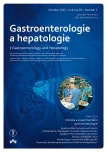Ledipasvir/ sofosbuvir – rapid development of knowledge reduces treatment time
Authors:
P. Husa
Authors‘ workplace:
Klinika infekčních chorob LF MU a FN Brno
Published in:
Gastroent Hepatol 2015; 69(5): 473-476
Category:
Hepatology: Review article
doi:
https://doi.org/10.14735/amgh2015473
Overview
Ledipasvir and sofosbuvir in a fixed-dose single-tablet combination have a variety of therapeutic indications in patients infected with hepatitis C virus genotypes 1, 3, and 4. According to the current European Association for the Study of the Liver Guidelines, the duration of therapy with ledipasvir/sofosbuvir in combination with ribavirin is 12 weeks in cirrhotic patients infected with hepatitis C virus genotype 1 or 4. This recommendation includes patients with both compensated and decompensated liver cirrhosis, both pre - and post-liver transplantation. An extension of combination therapy to 24 weeks is indicated only in cirrhotic patients with negative predictive factors for the achievement of a sustained virologic response, especially with profound thrombocytopenia or when ribavirin is contraindicated or poorly tolerated. The last revision of the summary of product characteristics of Harvoni from June 2015 recommends 24 weeks of therapy with LDV/SOF alone in compensated cirrhosis and 24 weeks of ledipasvir/sofosbuvir in combination with ribavirin in decompensated cirrhosis in both pre - and post-transplantation patients. This contribution provides an analysis of this contradiction.
Key words:
chronic hepatitis C – hepatitis C virus – HCV – sofosbuvir – ledipasvir – ribavirin
The author declares he has no potential conflicts of interest concerning drugs, products, or services used in the study.
The Editorial Board declares that the manuscript met the ICMJE „uniform requirements“ for biomedical papers.
Submitted:
14. 8. 2015
Accepted:
7. 9. 2015
Sources
1. European Association for Study of Liver. EASL recommendations on treatment of hepatitis C 2014. J Hepatol 2014; 61(2): 373 – 395. doi: 10.1016/ j.jhep.2014.05.001.
2. European Association for Study of Liver. EASL recommendations on treatment of hepatitis C 2015. J Hepatol 2015; 63(1): 199 – 236. doi: 10.1016/ j.jhep.2015.03.025.
3. American Association for the Study of Liver Disease. HCV Guidance: Recommendations for testing, managing, and treating hepatitis C. Available from: www.hcvguidelines.org.
4. Souhrnu údajů o přípravku Harvoni [on-line]. Dostupné z: http:/ / www.ema.europa.eu/ docs/ cs_CZ/ document_library/ EPAR_ – _Product_Information/ human/ 003850/ WC500177995.pdf.
5. Bourlière M, Sulkowski MS, Omata M et al. An integrated safety and efficacy analysis of >500 patients with compensated cirrhosis treated with ledipasvir/ sofosbuvir with or without ribavirin. Hepatology 2014; 60 : 239A.
6. Bourlière M, Bronowicki JP, de Ledinghen V et al. Ledipasvir ‑ sofosbuvir with or without ribavirin to treat patients with genotype 1 infection and cirrhosis non‑responsive to previous protease‑inhibitor therapy: a randomised, double‑blind, phase 2 trial (SIRIUS). Lancet Infect Dis 2015; 15(4): 397 – 404. doi: 10.1016/ S1473 ‑ 3099(15)70050 ‑ 2.
7. Flamm SL, Everson GT, Charlton M et al. Ledipasvir/ sofosbuvir with ribavirin for the treatment of HCV in patients with decompensated cirrhosis: preliminary results of a prospective, multicenrter study. 65th Annual Meeting of the American Association for the Study of Liver Diseases (AASLD). Hepatology 2014; 60 : 320A.
8. Reddy RK, Everson GT, Flamm SL et al. Ledipasvir/ sofosbuvir with ribavirin for the treatment of HCV in patients with post‑transplant recurrence: preliminary results of a prospective, multicenter study. Hepatology 2014; 60 : 200A–201A.
9. Gane E, Manns MP, Forns X et al. 365 Ledipasvir/ sofosbuvir with ribavirin is safe and efficacious in decompensated and post‑liver transplantation patients with HCV infection: preliminary results of the prospective SOLAR2 trial. Gastroenterology 2015; 148(4): S ‑ 978. doi: 10.1016/ S0016 ‑ 5085(15)33342 ‑ 4.
Labels
Paediatric gastroenterology Gastroenterology and hepatology SurgeryArticle was published in
Gastroenterology and Hepatology

2015 Issue 5
- Possibilities of Using Metamizole in the Treatment of Acute Primary Headaches
- Metamizole vs. Tramadol in Postoperative Analgesia
- Spasmolytic Effect of Metamizole
- Metamizole at a Glance and in Practice – Effective Non-Opioid Analgesic for All Ages
- The Importance of Limosilactobacillus reuteri in Administration to Diabetics with Gingivitis
-
All articles in this issue
-
XXIXth Hildebrand Bardejov gastroenterology days
Inflammatory diseases in case reports and well-arranged lectures - The selection from international journals
- Leaving
- A pilot experimental study of oesophageal stenosis after ESD
- Variable endoscopic appearance of early squamous cell carcinoma of the oesophagus
- First experience with digital Spyglass™ DS in Slovakia from the gastroenterology department of the Trnava University Hospital
- Endoscopic histologisation of diminutive colorectal polyps. Are we ready for a change?
- Quality of biopsies in patients with Barrett’s esophagus – jumbo vs. large capacity forceps
- Screening colonoscopy among elderly patients over 70 years
- Home parenteral nutrition – its importance and use in clinical practice
- Standard diagnostic and therapeutic approaches to chronic hepatitis C virus infection
- Ledipasvir/ sofosbuvir – rapid development of knowledge reduces treatment time
- Hands-on training of advanced endoscopic methods – an international workshop in Athens
- New approaches in the follow-up of patients suffering from inflammatory bowel diseases
-
XXIXth Hildebrand Bardejov gastroenterology days
- Gastroenterology and Hepatology
- Journal archive
- Current issue
- About the journal
Most read in this issue
- Endoscopic histologisation of diminutive colorectal polyps. Are we ready for a change?
- Screening colonoscopy among elderly patients over 70 years
- Home parenteral nutrition – its importance and use in clinical practice
- First experience with digital Spyglass™ DS in Slovakia from the gastroenterology department of the Trnava University Hospital
